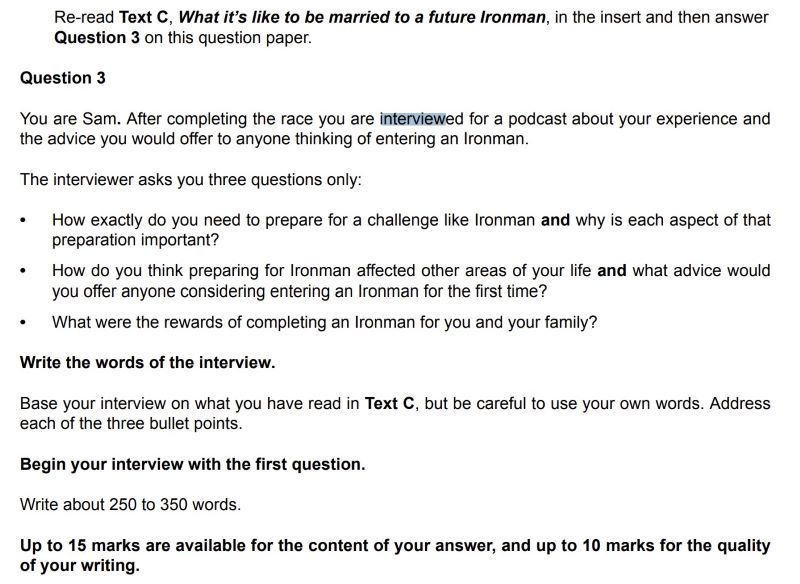Interview writing involves capturing the questions and answers from a conversation with an individual, typically conducted to gather information, insights, or opinions. It requires careful planning, good communication skills, and attention to detail.
Example: IGCSE Past Paper Question
Insert: Text C
Read Text C, and then answer Questions 2(a)–(d) and Question 3 on the question paper.
Text C:
What it’s like to be married to a future Ironman In this blog post the writer looks back on their husband’s preparations to compete in an Ironman event. I’m a little hesitant to publish this because there’s a risk that I’ll just be moaning and I’ll come across as whiny, but it’s information I wish someone had given me before we signed up for the whole Ironman thing.
My husband, Sam, started training in January for Ironman Canada at the end of July. He got himself an expert coach and monthly training plans. I felt reassured this meant he might at least survive the 3.86 km swim, a 180.25 km bicycle ride and a marathon (42.20 km) run, raced in that order. 5
His training ramped up as you’d expect. Initially, it didn’t really impact our lives too much. If anything, it was a good thing. Now, we were both training for things – it felt like a real partnership as we plotted our weekends to give us time to train and time together as a family. It was fun. If we went away, we had to fit his bike ride of 1–3 hours into the weekend but that was totally do-able. We’ve a pool where we live which really helped – not having to drive to/from water at least saved travelling time. 10
By May he was training early and most of both weekend mornings. Being honest, I resented that. I agreed sullenly, yes, I still wanted him to do the Ironman, and no, I didn’t expect him to drop out. I was just fed up with his absences. 15
June was all about Ironman. Endless weekends with Sam gone until 5pm each day. After exercise he would need to sleep for an hour or so, thus he was technically gone for longer. I was desperate for us to go away and have a break from it.
I tried to book a weekend camping but abandoned it. We would have spent the whole time fitting Sam’s training around what we were doing, and it wasn’t worth it. That year the kids didn’t go camping at all. 20
My own freedom to run was curtailed. Saturdays became all about childcare. I only managed one Saturday trail-run with the girls from April onwards and that was thanks to wonderful friends who got up at 6.45 on a Saturday to watch my son. I got fed up with not being able to say yes to invitations. 25
We didn’t do any family hiking for months. Sam justifiably didn’t want to hike after exercising.
There was so much laundry (‘different road conditions’) so much extra food (‘fuel’) and so much gear (multiple pairs of goggles with different tints ‘because you never know’)! Smiling understandingly, Sam assured me the next one will be cheaper. Next one? 30
‘Because it’s there,’ I’d snarl to anyone who dared question why any sane mortal would tackle an Ironman. I enjoyed mercilessly shaming his less-than-supportive business partner into recognising the potentially boundless benefits of Sam’s well-publicised adventure for their newly-established, fledgling travel company. A flurry of online articles described me as ‘a runner married to a triathlete’ – it took me a few moments to recognise our family and beam with immeasurable pride. 35

Interviewer: How exactly do you need to prepare for a challenge like Ironman, and why is each aspect of that preparation important?
Sam: Preparing for an Ironman is demanding and requires dedication. First, you need to allocate significant time for training, starting at least six months prior to the event. For example, I trained daily to build strength and endurance. Hiring a professional coach is also essential—they help you avoid mistakes and stay on track. Setting monthly training goals is crucial to monitor progress and build confidence. Specific activities like cycling and swimming sessions need focus because they are integral to the race. Equally important is maintaining a healthy diet and getting enough rest to support your body throughout the preparation.
Interviewer: How do you think preparing for Ironman affected other areas of your life, and what advice would you offer to anyone considering entering an Ironman for the first time?
Sam: Preparing for Ironman impacted my personal life significantly. My family often had to adjust their schedules around my training, and I missed out on activities like family outings and holidays. Balancing work was another challenge, as my colleagues were sometimes frustrated by my absences. My advice to first-timers is to communicate openly with your family and involve them in your journey. Planning ahead is critical—ensure that your responsibilities at work and home are managed efficiently. It’s also important to stay motivated and remember why you are taking on the challenge.
Interviewer: What were the rewards of completing an Ironman for you and your family?
Sam: Completing the Ironman was an unforgettable experience. Personally, it gave me a huge sense of accomplishment and mental strength—I now feel that I can overcome any challenge. My family, despite the sacrifices, shared in the excitement of the day. Seeing my kids cheer for me at the finish line was a moment of pure pride. It also brought us closer as a family, as they supported me every step of the way. Beyond that, I received recognition from friends, colleagues, and even the media, which boosted my confidence further.
Write a public review